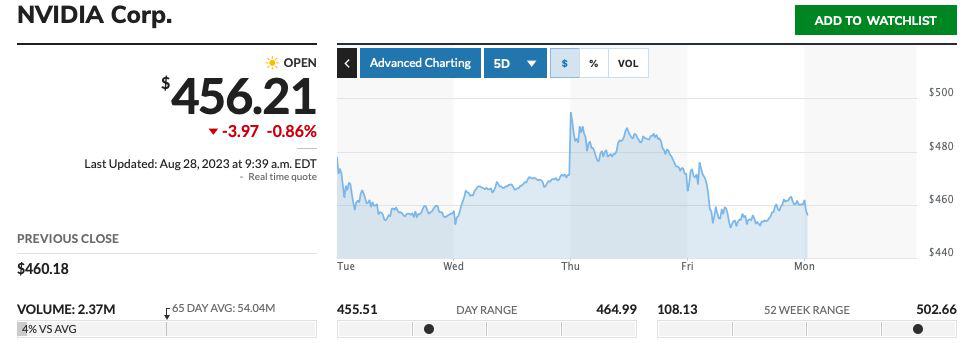
U.S. chipmaker Nvidia has posted an impressive Q2 2023 financial report, revealing a 101% year-over-year increase in revenue, with earnings per diluted share soaring by 854%. The company’s founder and CEO, Jensen Huang, declared the dawn of a new computing era as enterprises globally embrace accelerated computing and generative AI technologies.
A notable highlight of the quarter was the adoption of Nvidia’s H100 AI infrastructures by major cloud service providers. The development reflects industry’s rapid adoption of AI technologies, setting the stage for increased innovation and efficiency across various sectors.
Nvidia’s partnership initiatives played significant role, with collaborations spanning from enterprise IT systems to creative content generation. The company’s commitment to generative AI and accelerated computing is evidenced by its return of $3.38 billion to shareholders and the approval of an additional $25 billion for share repurchases.
The company’s data center business, including AI chips, saw remarkable revenue growth of 171% year-over-year, reaching $10.32 billion, driven by strong demand from cloud service providers and major internet companies.
Its gaming division witnessed a 22% revenue increase to $2.49 billion, while the business related to high-end graphics applications decreased by 24% to $379 million. Automotive revenue rose by 15% to $253 million.
Nvidia’s fiscal Q3 revenue is projected to be approximately $16 billion, surpassing the $12.61 billion forecast by Refinitiv and indicating a 170% growth from the previous year. The company reported a significant increase in net income, reaching $6.19 billion, or $2.48 per share, up from $656 million, or 26 cents per share, in the previous year.
The chipmaker’s recent financial report illuminates the transformative influence of its technology and AI across various sectors, encompassing data centers and gaming. This underscores the pivotal role of accelerated computing in molding the future.
Nvidia Faces China Risk and Valuation Questions Despite Strong Q2 Performance
Nvidia’s Q2 financial results have drawn attention to a potential risk in its growth trajectory, specifically related to its business in China.
As investors applaud the company’s revenue upswing and optimistic projections, executives express apprehensions about potential export limitations on data center GPUs to China. Although these restrictions aren’t anticipated to yield immediate substantial financial ramifications, there exists a lasting concern regarding the potential forfeiture of opportunities within one of the globe’s most extensive markets.
According to CNBC, China commands a substantial portion (20% to 25%) of Nvidia’s data center enterprise. Should the Biden administration contemplate curtailing China’s entry to pivotal technology, including high-end chips integral to AI platforms, Nvidia’s business could encounter adversity.
Other concerns have emerged about whether Nvidia’s valuation has reached its peak and whether the positive news has already been priced into the stock. The company’s dominant position in AI chips is due to its comprehensive full-stack approach that integrates chip design, hardware, and software. However, Gartner AI analyst Chirag Dekate presented a different perspective to the Financial Times. He argued that Nvidia’s rivals extend beyond chip manufacturers, including major computing platforms like Amazon Web Services, Microsoft Azure, and Google Cloud, which prioritize cost efficiency and might use their existing infrastructure to offer competitive AI capabilities.
Competition may gradually diminish Nvidia’s cost edge, given the potential of alternative solutions to offer enhanced flexibility and cost-efficiency. Additionally, the AI chip market retains its dynamism, offering room for alternative options to gain prominence. The pivotal query pertains to Nvidia’s forthcoming strategies in maneuvering the evolving AI services landscape.
Nvidia’s Performance Fails to Ignite Stock, Highlighting Market Unpredictability
Even though Nvidia’s sales were much better than expected, and its guidance for the next quarter was also great, the stock price didn’t react as expected. Those who bought the stock just before the results might have not seen big gains, which shows that even when a company does very well, the stock market response can be unpredictable.
Nvidia shares dipped in early August but rebounded due to the positive earnings report. Despite the post-report surge, Nvidia’s overall gain in the past month is about 8.9%.

Amid the escalating momentum of AI infrastructure expansion, astute investors are exploring alternative avenues.
Vertiv, a relatively less recognized participant, has emerged as a viable contender. Focusing on data center rack systems, power management, switchgear, and thermal heat control solutions, Vertiv stands to gain from the burgeoning demand spurred by the energy-intensive attributes of advanced AI semiconductor systems.
According to The Motley Fool, Vertiv outpaced Nvidia’s growth in the trailing 12 months, tripling its value during that period.
Source: mPost



